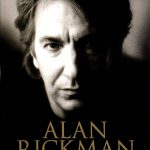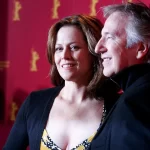Truly Rickman
ACCORDED in startling virginal white in the sex drama Liaisons Dangereuses, he worked in a fire intensified by fluttering fans and blazing pheromones.
As arch-villain Sheriff of Nottingham in Robin Hood: Prince of Thieves he had the talisman of a medieval rock star’s false black locks and a gasping swing of a murderous sword.
Soft focus lenses and the author’s victimisation of his lamenting lover with melancholic grief and an infestation of rats charged the audience in Truly, Madly, Deeply.
ADMIRERS
But Alan Rickman in “go-to-the-pub” garb, had no script and no props (other than tubular chairs and coffee table) when taking to stage of the West Yorkshire Playhouse last night in the company of Jude Kelly, its artistic director.
Such is fame that Alan’s reputation drew an estimated 750 admirers to cram the Quarry Theatre for his “Outloud event,” in which Jude conducted a National Theatre-type question and answer session.
“House full” signs up before he had said a word or playgoers had even got a whiff of The Winter Guest, Sherman MacDonald’s world premiere play about four couples in a Scottish seaside town.
A mother and daughter struggle to discover love for each other; two boys on the beach balance exhilaration again uncertainty; two ardent teenagers clumsily try to forage a relationship and two old ladies concentrate on cakes and cremation.
This Alan will direct from January 19.
Jude said that Alan always observed that regional theatre is a powerhouse important to the way theatre that Britain has developed and asked him how urgent was his feeling for the theatre when he began acting.
He said that he had started late at 26 when his values were formed better than when he was younger—”all of me came together.”
He agreed that he quickly became established in national companies, but not necessarily in major roles. After four years he ran away from the Royal Shakespeare Company and went to work at the 90-seater Bush Theatre under his great influence and mentor Richard Wilson—”he taught me.”
“At Stratford-Upon-Avon you learned how to bark at 1,500 people,” he said.
Alan lamented the dearth of new theatre writing—”the best creative talents have gone to the ad agencies… recent times have been terrible, terrible years for the cultural life of this country.”
The wickedness generated in Liaisons Dangereuses, in which he was the vile corrupter of females, was “electrifying and frightening.”
“It was the archetypal play of the 1980s, relating in some way to our situation. After one performance someone said, paraphrasing a description of a weepie, ‘There wasn’t a dry seat in the house’.”
It was a dangerous play for actors to perform, projecting so much evil over a long spell, he said. It had been likened to climbing Everest every night and finding near the end someone had lopped the top off.
On the difference between the stage and Hollywood movies, Alan said: “I am the same instrument… the same bundle of instincts and uncertainties… you go from one to the other and just act… an instrument.”
The rapt audience buzzed at Jude’s innocent double entendre when she said “When you point your instrument somewhere else…” Gusts of laughter whirled and were renewed when a woman in the audience asked Alan “how much of your bits were cut in Robin Hood?”
Responding to Jude’s opinion that his was the best Hamlet she had seen, Alan said: “I was just relieved to get from one end of the play to the other. It is ludicrous in having four soliloques coming one after another.”
Asked from the audience if financial profit or artistic satisfaction influenced his choice of roles, Alan said: “I would not be sitting here now and neither would you if I hadn’t done Robin Hood or Die Hard and I wouldn’t have done some other films but for them. It’s a trade off.”
He fielded with aplomb the question of whether fame had corrupted him. “Probably to some extent — one’s aware of moments when you have stamped your little foot in a childish way.”
GENES
“Talent is an accident of genes — and a responsibility,” he said. “You are given this thing and everybody has talent… mine just happens to be for acting and that creates a situation like this. It is a strange and powerful responsibility.
“The same is more true when there is a text by a really wonderful writer because you can have that extraordinary sense that 750 people become one unit and receive an idea — you can feel the wheels turning as an idea is received and that is the power of the theatre.”



